Annual Planning for PhD Students: A Feel-Good Bottom-Up Approach
Overwhelmed by annual goals? Try this approach instead that builds upon what you enjoy at the day to day level.
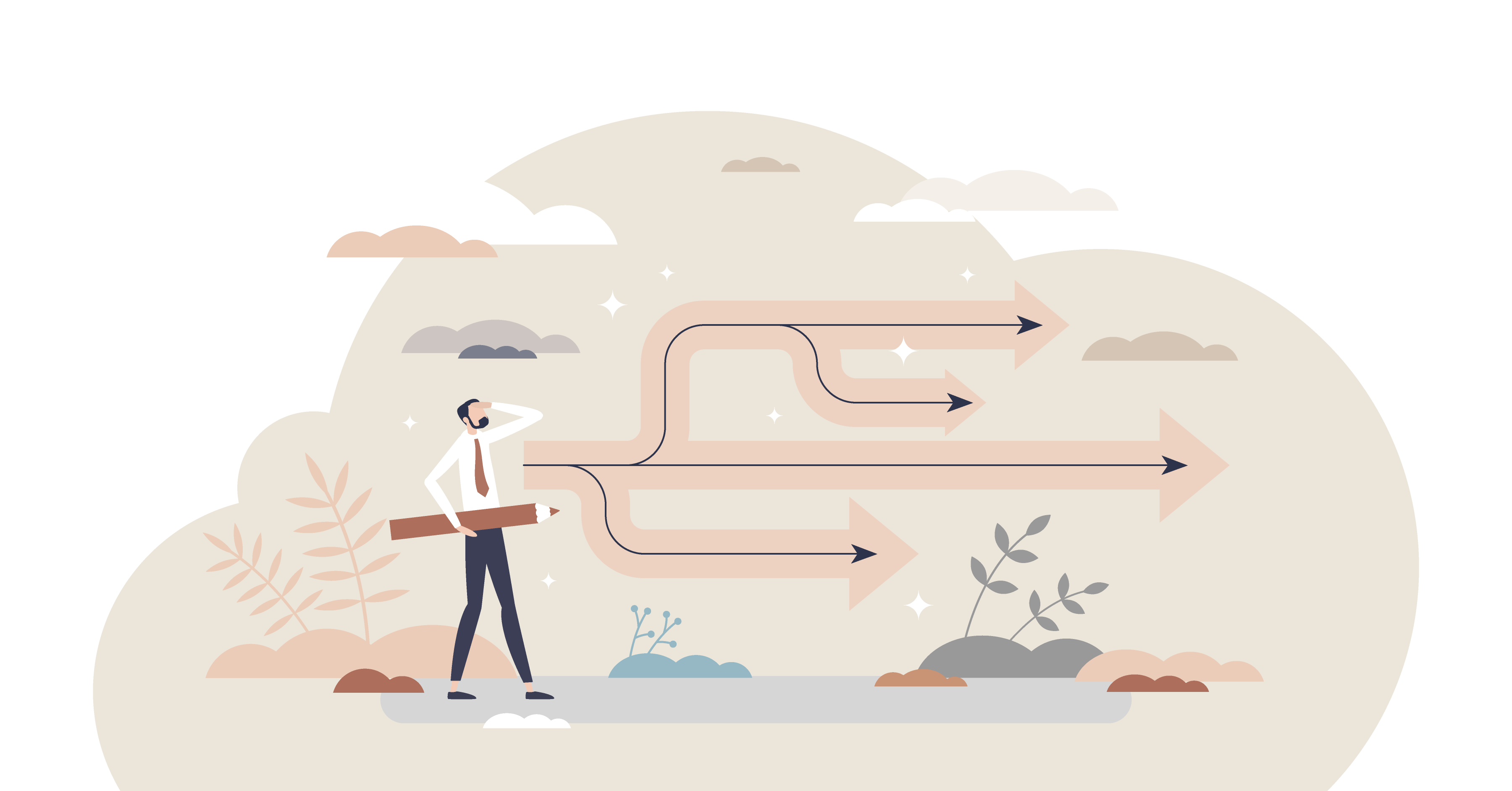
As PhD students and researchers, we often feel the need to set big ambitious goals to get work published, complete chapters, get talks at at conferences... I could go on. Whilst we all need direction - or a vision - what does this really mean on a Tuesday morning when you’re 1 hour late after the schools have a delayed opening and you’ve got a paper to review, some admin you need to get done, a fieldwork trip to plan and a conference abstract deadline and well, you’re a little low on energy after a rubbish night’s sleep?
I feel overwhelmed just writing this. And I bet you do too.
I'm here to show you an alternative approach to help ensure the day-to-day builds up with a little less unpredictability.
Why traditional planning can fall short
Here's the problem: When we set out our thoughts for the year ahead, we typically start with grand sweeping goals. While inspiring, these are incredibly hard to translate into daily practices. Take writing and publishing a paper. Great goal! But what does that actually mean at 10:30 AM on a Tuesday in the third week of March?
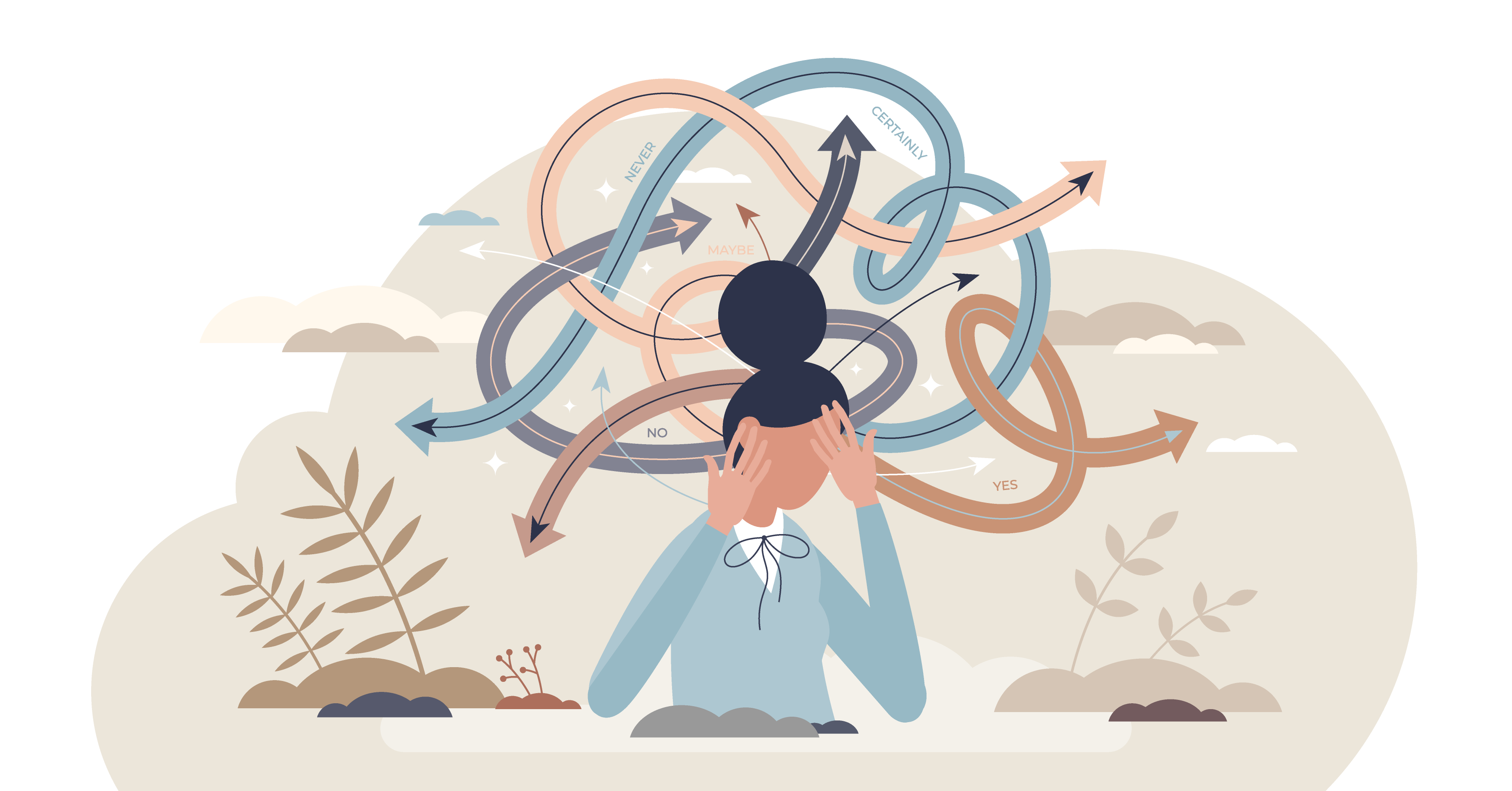
Try a different approach - start with what you enjoy
I'm a great fan of Ali Abdaal, and after reading his book 'Feel Good Productivity', I now make sure 'joy' is at the centre of everything I do. As Ali says in his book, "Seriousness is overrated. If you want to achieve more without ruining your life, the first step is to approach your work with a sense of play".
I'm also a great fan of organizing stuff. Be that time or the spices in my kitchen, organization is my thing. However - and this is important - that doesn't mean everything in my life is organized. I really struggle to set plans for the longer term. The future just seems so... far away... and unpredictable.
In the last year, I've found a different approach: start from the bottom up. Look at the things that bring joy and motivation on a daily basis. Because whether we like it or not, this is where the actual movement toward those big, hairy, audacious goals begins. You won’t find any SMART goals in this approach, so if the very word makes you shudder, this is for you.
The logic is simple:
- If we find small things that motivate us each day, the more challenging tasks become easier to handle
- When something feels good, we naturally want to do more of it
- Rather than forcing ourselves to do things we "should" do, we start with what energizes us
By fitting the exciting things into our plan first, we can prioritize activities that give us energy while understanding how they connect to the bigger picture.
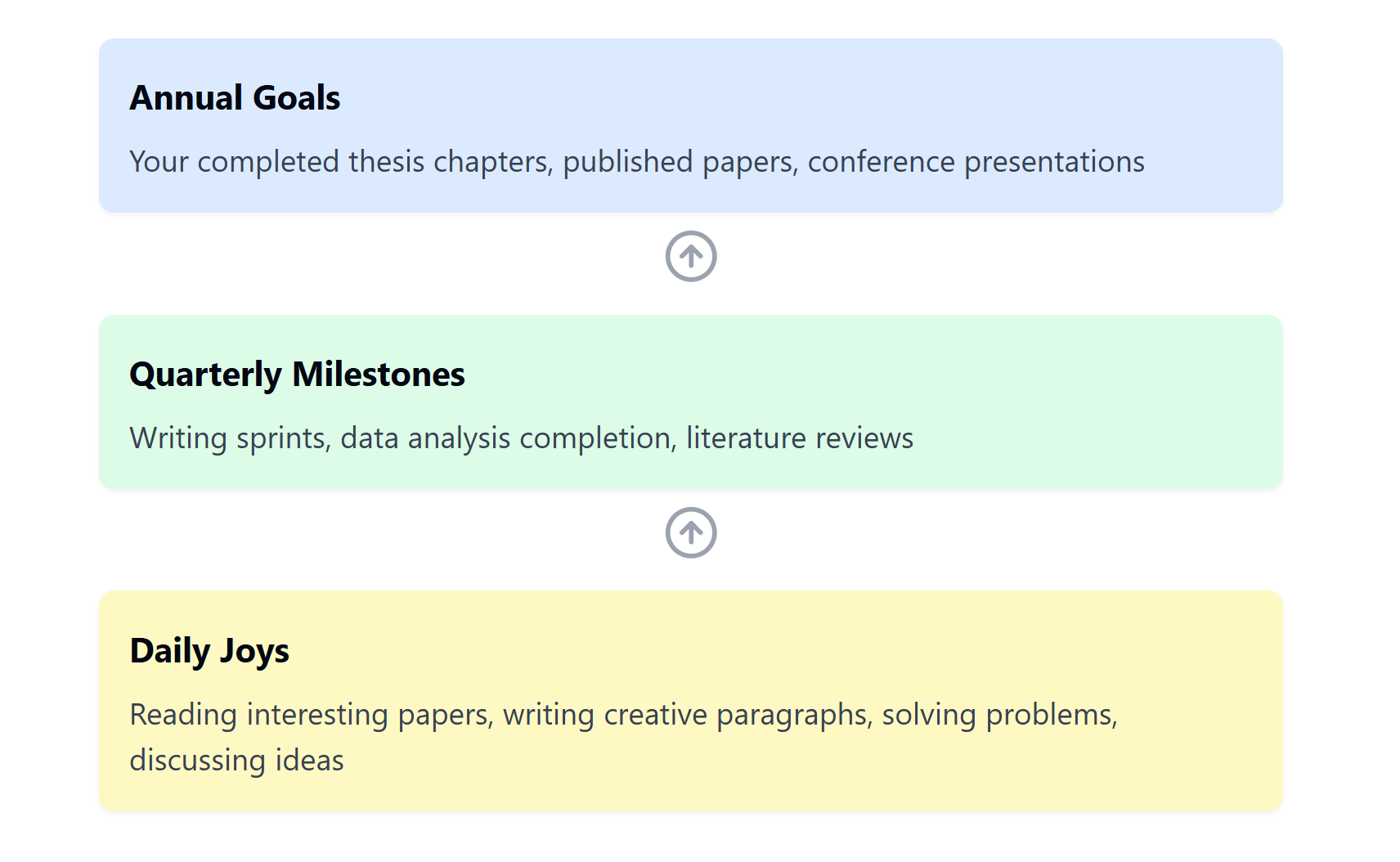
What does this upward planning look like?
While we'll focus on research and writing here, these principles can apply to any area of life. The key is starting with what brings you joy and building upward from there.
Start with two lists…
For the bottom-up approach, I typically start by making two lists: one for immediate pleasures, and another for activities that require initial effort but create positive energy once completed.
List 1: The most fun stuff
These are activities that light you up immediately - things you could happily do all day. Here’s some examples from my list:
- Lab work
- Writing notes
- Analysing new data
- Finding order in chaos
- Starting a new blog article
- Scribbling a concept diagram
- Reading an exciting and novel paper, or book
Why this list matters: Unlike annual and monthly plans that change dramatically, these core pleasures remain remarkably stable. They form a reliable foundation for your planning.
List 2: Fun stuff but with a touch of resistance
These activities require some initial effort but create positive energy once completed - think of them as 'quick wins' in terms of feel-good productivity:
Again, here’s some examples for me:
- re-drafting
- email inbox zero
- editing a blog article
- supervisor meetings…
- having a clean and tidy house
- doing a weekly/monthly review
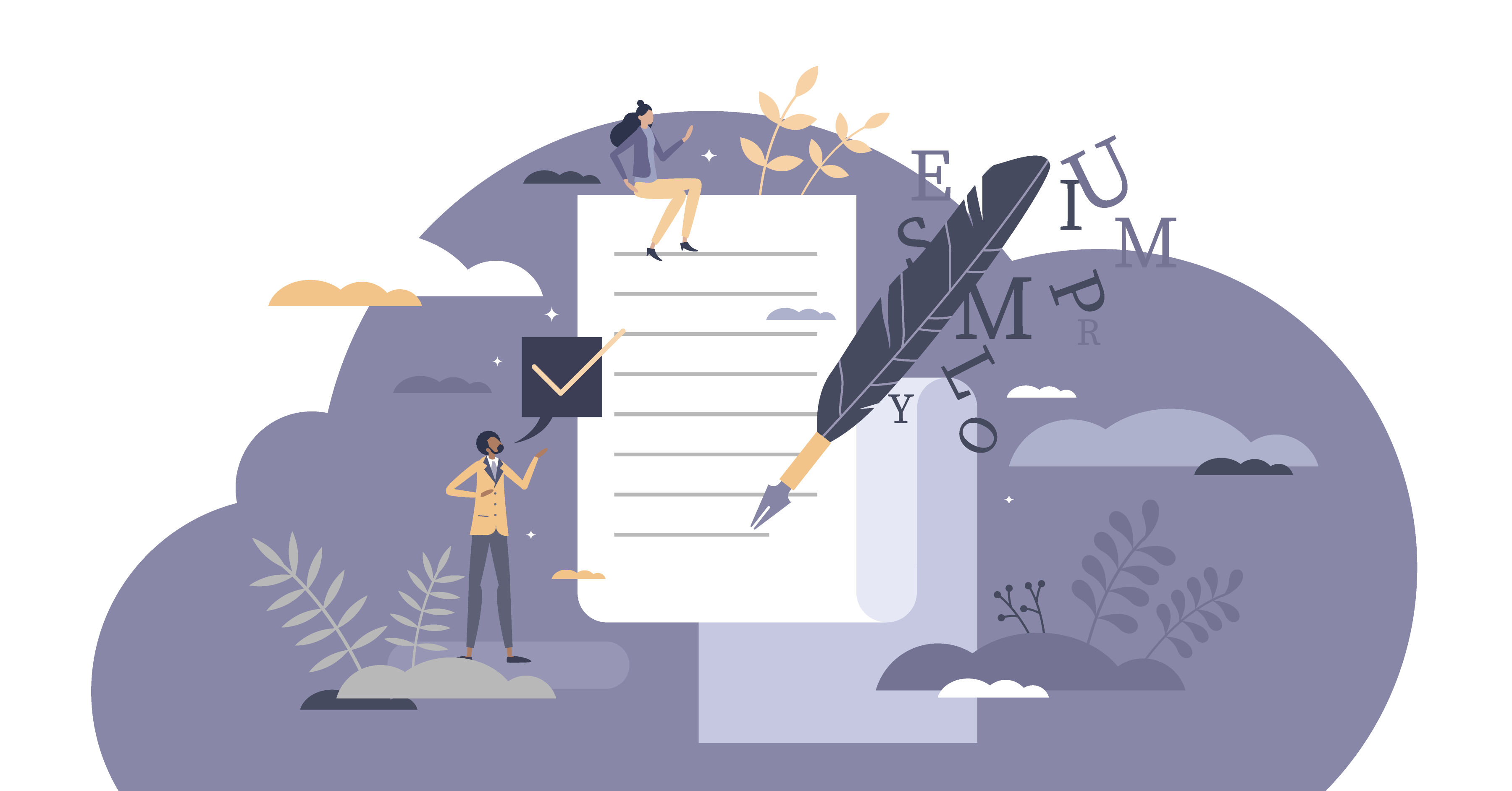
Connecting joy to your bigger goals
The crucial insight is this: your daily pleasures must connect somehow to your bigger goals. It could be a long and winding path, but if you can’t see the connection, you might want to take another look at the bigger picture. As Simon Sinek emphasizes in 'Find Your Why', understanding your deeper motivation is essential. (I have written about why, knowing your ‘why’ as a PhD student is particularly important, over on this blog post).
Let me share a personal example of what happens when this connection is missing. I want to lose weight, but I haven't yet found consistent daily activities that genuinely energize me toward this goal. Without that underlying current of enjoyable progress, I'm swimming upstream. While "grit and bear it" can work, it requires immense willpower and often means sacrificing other activities. From experience, having that underlying current of enjoyment makes the difference between success and failure. Choose your upstream battles carefully.
Crafting your ideal day
"Your life is made up of a series of ordinary Tuesdays. Figure out what your ideal normal Tuesday looks like. Because if you can have an amazing Tuesday, you'll probably have an amazing life" - Tim Ferriss
The key to daily and weekly planning is treating your enjoyable activities like components of a balanced diet:
- Use them to bookend challenging tasks
- Schedule them strategically throughout your day
- Think of them as energy management tools - because energy is one of our most valuable assets, more so than time
- Balance "nutritious" goal-advancing activities with pure enjoyment
Once I understand what a fun day might consist of, then I can start looking at longer timescales and how I might be able to compound these daily joys into the grand plan.
Remember: While it's important to include activities you love, they should primarily move you toward your bigger goals and desires. Too many "sugary" activities - those which are fun but lack purpose - don't help in the longer run. But don't completely exclude them either. It's all about a balanced diet.
![[compound joy in tasks - claude.png]]
Scaling up - the 12 week quest
After identifying our daily joys, let's think bigger - but not too big. Enter the 12-week planning horizon, a sweet spot between daily actions and annual goals.
Why 12 weeks works
I use a conglomeration of two approaches for this time scale. First, there's "The 12 Week Year" by Brian Moran and Michael Lennington, who emphasize that "the greatest predictor of your future are your daily actions." Perhaps an extra incentive to make our daily tasks fun. While I'm skeptical about their claim of "doing more in 12 weeks than others do in 12 months," breaking the year into manageable chunks has really helped me work more efficiently. Anything more than three months and things get a bit unpredictable and unwieldy.
The second influence comes from Ali Abdaal's concept of "Quarterly Quests." The idea of framing each quarter as a quest adds the fun element into planning. Like any good quest, there will be challenges, but you also get to be the hero in the end. Who doesn't want that? And if twelve weeks feels overwhelming, start with one month. Every epic quest starts with a single step.
How the lists help make bigger plans
Take your lists and bundle them together to see how they can compound into bigger things. Here's how I combine tasks to create enjoyable workflows:
- For every paper I read, I'll write some notes about it and organize it into my system
- I'll get up early in the morning, spend 45 minutes starting a new blog post then 15 minutes editing a blog post
- I'll do a biweekly review finding the order in a chaotic week and clear out my inbox
- I'll analyze the data I collected this week and make notes on the results
- I'll redraft a paragraph after reading an exciting paper
That's just a few examples of how I integrate the fun tasks with the slightly less fun tasks. You'll notice I haven't included any tasks I don't enjoy at this stage. We're not going to worry about these for now. This approach is all about making the enjoyment framework and, importantly, finding those natural connections between tasks I love and those that need doing.

The time management game
Every quest needs its final showdown. Sooner or later I'll have to face the big, hopefully not bad, boss at the end. I aim to set meaningful deadlines within each 12-week cycle - for me currently one thesis section per quarter. As Parkinson's Law tells us, "work expands to fill the time available," so these deadlines create gentle and consistent pressure.
But don't forget to plan in contingencies. Here's what I include in a 12-week quest:
- 1 week for complete rest (totals to 4 weeks/year)
- 3 weeks buffer time for life's plot twists (illness, family, unexpected side quests)
- 9 weeks for focused work (though not all of this will be productive time)
The reality is that in a three-month period, I only get about two months of truly productive time toward my main quest. And that's perfectly okay! From the countless people I've known to do PhDs, the typical time allocation I see is one year learning what a PhD is/your subject area, one year making mistakes, and one year of 'actual' PhD. I feel I am perfectly on track 😁
Remember the 'save' points
Just as good games have save points, build in regular check-ins through weekly or monthly reflection days. Just keeping a list of the things I have done (a 'To Done' list) is valuable in those inevitable moments when things are rough. I don't do these all the time but it can be very motivating to look back to see from where you have come.
Also consider how you work. If you are an all-or-nothing kind of person, protect the 'all' moments, and accept the 'nothing' ones. In this scenario I would use down time to optimize and improve the good times. Ask what things you can do to get into the all moments, how you can increase the time, how you could make them even better etc. Small changes in how I work at different times compound over time.
By reflecting I build more trust in myself that there are great times and there are bad times, but I have to trust the process and the good days will come after a period of not-so-good days; one high-energy productive day can offset a whole week of lower-energy ones.
Also for the ladies out there, don't fight your body's natural rhythms - work with them. For instance, I know that one day each month, my hormones will rage and I'll just want to watch TV all day. Instead of fighting this, I accept it and plan around it. Perhaps I could catch up on podcasts from my favourite academics? Or go for a walk to think things through? The key isn't to push through every day with the same intensity, but to recognize when you have the energy to make significant progress and when you need to rest and recover. By building in fun to our day, we can improve the predictability of how we feel.
The feel-good annual goal(s)
Just as every epic game has a final level, every academic year needs its big picture goals. Those conference deadlines still need to be in your 'feel good calendar'. But here's where this bottom-up approach is helpful - by focusing on daily joys and quarterly quests, the annual achievements often emerge naturally, like levelling up in a game. I love a natural approach to systems, because its a much more organic way to grow.
If you're up for more nature-inspired systems learning, make sure to sign up for my newsletter.
How daily joys compound into yearly wins - personal examples
Since starting this approach in June 2024 last year, I've seen how compounding small daily tasks I enjoy build into significant achievements. Without trying to force anything, my daily habits have created:
- Blogs with about 80 articles and newsletters (from my love of writing, and wrangling and explaining concepts) - technically this has been since Q3 2022
- An understanding of how AI can help me work smarter, not harder - I had to, and continue to, put a huge amount of work in first, but now that I’ve worked out how we work together, it’s nothing short of amazing.
- A personal knowledge system with a system I now feel works with me, not against (slowly emerging from my passion for organizing ideas) - it’s taken me 18 months to get to this point
- Conducting, analysing, and writing half, of a comparative review in a month FTE
- Submitting a chapter draft that had been hanging around like a bad smell for years!
Take inspiration from others
Something that remains with me is a talk given by Dr Dan Evans at the British Society of Soil Science’s Annual Early Careers Conference in December 2023. He talked about how he viewed his funding applications and successes as a series of LEGO bricks which he has built together to create the foundation upon which he has build his career. He showed how some bricks built the foundation for other bricks on top.
This idea has remained with me and I keep a document with my building blocks of funding I have applied for and received over the years since my undergraduate degree. I didn’t think I was particularly proficient at getting funding, but now that I have mapped it out, it makes me feel a lot happier and more confident for applications in the future. I can see how things build together despite this process starting all the way back in 2004.
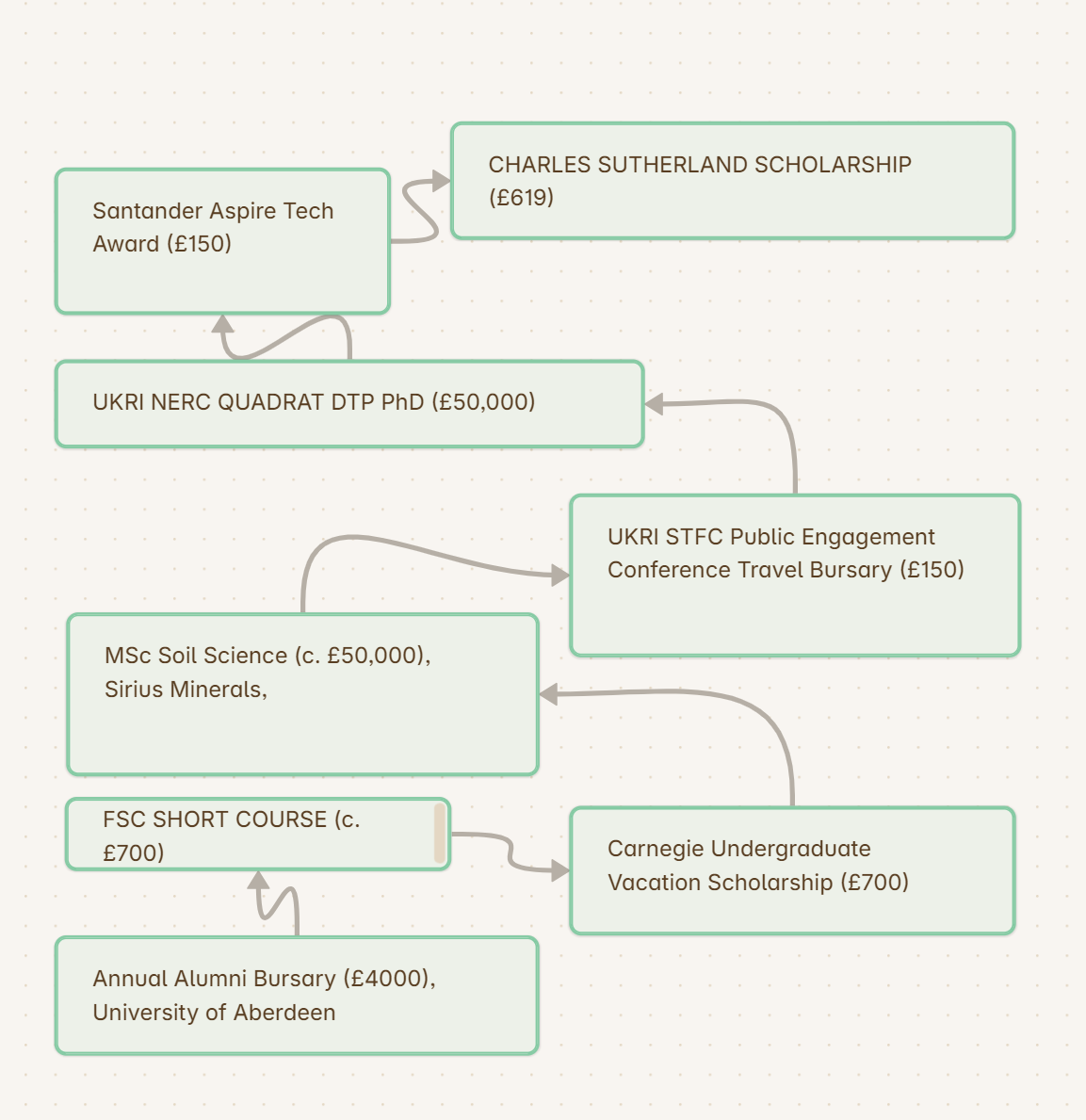
To return back to how I plan my time, my daily writing sessions become thesis chapters or blog articles like this one. My comparative literature review will (hopefully) transform into a published paper.
Balancing the fun with the necessary
Of course, not everything in a PhD year is fun - there will always be administrative tasks, mandatory training, and deadlines that feel much less exciting. The trick is to wrap these necessary elements in layers of activities you enjoy. It’s a bit like adding vegetables to your favourite meal - they're important for a balanced diet, but probably aren’t what you enjoy most. Bring on dessert 😜 We can use fun tasks to dress up our veggies and make them a perfectly enjoyable part of a meal.
Some strategies I use:
- Bookend tedious tasks with enjoyable ones
- Break unavoidable challenges into smaller pieces
- Find ways to add creative elements to routine work - I have Ali Abdaal’s phone background to remind me - “what would this look like if it were fun?”
- Celebrate completing the less enjoyable parts - I’m all for rewards!
If I can make annual goals as a game I want to play, not a chore I have to complete, then their achievement will be much more likely. They become the natural culmination of all those daily joys and quarterly quests, not a separate burden I need to carry.
This approach is designed around you
The beauty of this bottom-up approach is that it's inherently personal - what brings you joy won't be exactly what brings me joy. Start by making your own lists of enjoyable activities, experiment with combining them in ways that work for you, and gradually build up to those bigger goals. If writing is your worst-enemy-ever, this approach will bypass that, and might highlight, for example, you should focus on talks and creating videos instead. It might not end up in a published paper, but there is more than one way to communicate science! Work to your strengths and joys!
Remember: if it feels good, you're more likely to keep doing it.
A note on how I used AI for this post, and more generally
This article was written in collaboration with Claude AI (Anthropic). While the experiences, insights, and core content are entirely my own, I used Claude to help structure the piece, refine the flow, and optimize it for clarity. Claude helped analyse my draft for readability and suggested organizational improvements, much like a skilled editor would. All examples and personal experiences remain authentic and drawn from my PhD journey. I believe in being transparent about AI usage while maintaining the genuine, human perspective that makes this content valuable.
